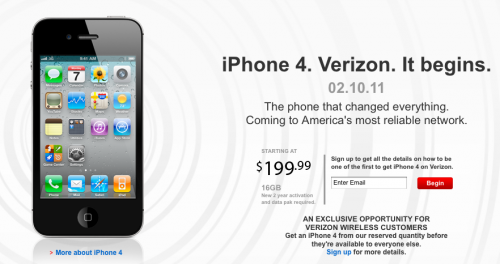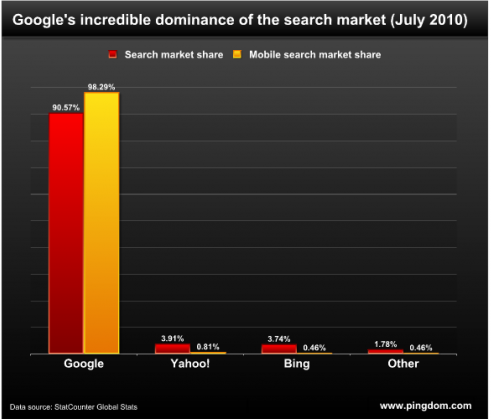How Will Google Be Impacted By Verizon’s iPhone?
In the event you were “off planet” yesterday you still might not know that Verizon is getting its own version of the iPhone on February 10. There are some differences between the Verizon and AT&T versions of the iPhone beyond their underlying technology (CDMA vs. GSM). Among them Verizon is offering an unlimited data plan […]
In the event you were “off planet” yesterday you still might not know that Verizon is getting its own version of the iPhone on February 10. There are some differences between the Verizon and AT&T versions of the iPhone beyond their underlying technology (CDMA vs. GSM). Among them Verizon is offering an unlimited data plan (no longer available at AT&T) and you’ll be able (for an as-yet-undisclosed price) to use the handset as a hotspot to run up to five devices. (In addition Verizon is also going to get a CDMA-enabled iPad.)
There had been much speculation leading up to yesterday’s announcement about who needs whom more, Verizon or Apple. Verizon has 93 million US mobile subscribers and so opens up a gigantic new market to the iPhone, whose growth has been flat and recently overtaken by Android in the US, according to comScore. By the same token the absence of the iPhone was a huge omission in Verizon’s handset lineup and hindering the largest US carrier in its battle with AT&T for customers.

Both Verizon executives and Apple COO Tim Cook, who attended the press event yesterday in New York, made statements about customer demand for a Verizon iPhone. There were also a number of surveys in early and mid-2010 that seemed to validate those remarks and indicate significant “pent up demand” among Verizon customers for the iPhone. We’ll have to see when it goes on sale in a couple of weeks how much demand there actually is.
Verizon’s chief defense and weapon against the iPhone until now has been Android. The carrier invested many millions of dollars in ad campaigns (“Droid Does”) that bashed both the iPhone and the AT&T network. It essentially built the Android brand for Google. And there were even rumors that as a quid pro quo for supporting Verizon’s position on net neutrality Google was asking Verizon to prevent the iPhone from coming to the carrier. However that rumor was never substantiated and is unlikely to have been accurate.
[youtube]https://www.youtube.com/watch?v=OY3452BNgvo[/youtube]
One surprising factoid to emerge from the press conference was the revelation that during the iPhone-bashing ad campaigns Verizon and Apple were already secretly working together (since 2008) on the CDMA version of the device.
Financial analysts have been speculating for the past two or so weeks about how many iPhones Verizon might sell in 2011 (12 million, 14 million?) and what the corresponding impact on Android or RIM sales might be.
Android has established a loyal following but its “brand” and visibility are still not as great as the iPhone outside of tech circles and early adopters. However Sprint and T-Mobile will be aggressively pushing Android handsets, partly because neither has access to the iPhone at the moment. Eventually they’ll probably get it but how long that will take is unclear.
I tend to believe that some would-be Android buyers will in fact opt for the iPhone now that it’s at Verizon. The question is how big will this shift be? In the near term, however, RIM may be the company that sees the most “defections” as Verizon customers with older BlackBerry handsets switch to the iPhone rather than getting the Torch or other RIM smarthones. Again, by May all this will become more clear. But the iPhone at Verizon will likely slow Android’s momentum somewhat.
Even if the bottom were to fall out of Android sales at Verizon, which it won’t, Google’s mobile search and advertising programs would still prosper. Indeed, Google’s mobile success is not tied directly to Android sales as much as the ongoing Apple vs. Google debate impliedly suggests.
Google of course would love to see everyone with an Android handset in their pockets. But the iPhone is also a “Google search device” in the sense that Mountain View dominates search volumes coming from the Apple handset. Similarly AdMob is well established on the iPhone and among iPhone app developers as a leading mobile ad network.
It’s true that Google isn’t as central to the iPhone user experience as it is on Android but Google has a very strong presence on the iPhone. Remember Google doesn’t make significant money directly off Android itself; it makes money off search and display ads on mobile devices. So if the iPhone does sell many millions of handsets through Verizon and helps grow the smartphone market further, even if it comes to some degree at Android’s expense, Google probably won’t be too disappointed.
Related posts:
- A Tale Of Three Android Phones: Droid 2, Samsung Fascinate & Google Nexus S
- Estimate: Google Mobile Search Market Share Near 100%
- Google Gaining Ground In Smartphone, Browser Markets
- How Cool Would It Be If Google Became A Carrier?
- ComScore: One In Four Have Smartphones In US
- Google & Apple Extend Search Deal, Emerge As “Frenemies” Not “Froes”
- Skyhook Wireless Sues Google: You Lie About Android “Openness”
- Google Phone Gallery Presents A Comparison Engine For Android Handsets
- Report: The Top Two iPhone Search Engines — Are Both Google
- Report: Voice Searches 3X More Likely To Be Local
- Google Maps On Android Becoming An LBS Juggernaut
Contributing authors are invited to create content for Search Engine Land and are chosen for their expertise and contribution to the search community. Our contributors work under the oversight of the editorial staff and contributions are checked for quality and relevance to our readers. The opinions they express are their own.
Related stories
New on Search Engine Land
